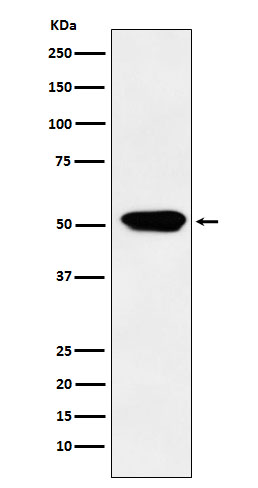
| WB | 1/1000-1/2000 | Human,Mouse,Rat |
| IF | 1/20-1/50 | Human,Mouse,Rat |
| IHC | 1/100-1/200 | Human,Mouse,Rat |
| ICC | 技术咨询 | Human,Mouse,Rat |
| FCM | 咨询技术 | Human,Mouse,Rat |
| Elisa | 咨询技术 | Human,Mouse,Rat |
| Aliases | CYP4A; Cyp4a1; Cyp4a10; CYP4A11; Cyp4a14; Cyp4a3; CYP4A7; CYP4AII; CYPIVA11;;Cytochrome P450 4A11 |
| WB Predicted band size | Calculated MW: 59 kDa ; Observed MW: 50 kDa |
| Host/Isotype | Rabbit IgG |
| Antibody Type | Primary antibody |
| Storage | Store at 4°C short term. Aliquot and store at -20°C long term. Avoid freeze/thaw cycles. |
| Species Reactivity | Human,Mouse,Rat |
| Immunogen | A synthesized peptide derived from human Cytochrome P450 4A11 |
| Formulation | Purified antibody in PBS with 0.05% sodium azide,0.05% BSA and 50% glycerol. |
+ +
以下是3篇关于Cytochrome P450 4A(CYP4A)抗体的经典文献摘要信息,供参考:
---
1. **文献名称**: "Cytochrome P450 4A isoform-specific antibodies: Tools for functional studies"
**作者**: Capdevila, J.H. et al.
**摘要**:该研究开发了针对CYP4A亚型(如CYP4A1、CYP4A3)的特异性多克隆抗体,并通过Western blot和免疫组化验证了其在啮齿类动物肾脏和肝脏组织中的特异性。重点揭示了CYP4A酶在20-HETE(血管活性二十烷酸)合成中的关键作用。
---
2. **文献名称**: "Antibody-directed characterization of CYP4A-mediated arachidonic acid metabolism in hypertension"
**作者**: Roman, R.J. & Alonso-Galicia, M.
**摘要**:利用CYP4A抗体研究发现,自发性高血压大鼠(SHR)肾脏中CYP4A2/4A3表达显著上调,导致20-HETE过度生成,进而通过血管收缩和钠潴留机制加剧高血压,提示CYP4A抗体可作为高血压相关代谢研究的工具。
---
3. **文献名称**: "Immunohistochemical localization of CYP4A in the renal microvasculature"
**作者**: Ito, O. & Falck, J.R.
**摘要**:通过免疫荧光结合CYP4A抗体,证实了CYP4A11和CYP4A22在肾小球前微动脉平滑肌细胞中的高表达,并发现其代谢产物20-HETE通过调节肾血流量影响血压稳态,为肾脏缺血性疾病研究提供了抗体应用范例。
---
**备注**:如需获取全文,建议通过PubMed或Sci-Hub输入标题/作者查询。实际研究中建议优先选择近5年文献以获取抗体应用的最新进展。
Cytochrome P450 4A (CYP4A) antibodies are immunological tools used to detect and study CYP4A enzymes, a subfamily of the cytochrome P450 monooxygenase superfamily. These enzymes are primarily involved in the metabolism of fatty acids, particularly the ω-hydroxylation of arachidonic acid and other eicosanoids, playing critical roles in blood pressure regulation, vascular function, and lipid homeostasis. In mammals, CYP4A isoforms (e.g., CYP4A1. CYP4A2. CYP4A3. and CYP4A8 in rodents; CYP4A11 and CYP4A22 in humans) are expressed in tissues such as the liver, kidney, and vasculature. Dysregulation of CYP4A activity has been linked to hypertension, renal disease, and metabolic syndromes, often through the production of bioactive lipid mediators like 20-hydroxyeicosatetraenoic acid (20-HETE).
CYP4A antibodies are essential for identifying enzyme localization, expression levels, and activity in experimental models. They are widely used in techniques like Western blotting, immunohistochemistry, and immunofluorescence to investigate tissue-specific CYP4A distribution under physiological or pathological conditions. Some antibodies exhibit cross-reactivity across species (e.g., human, rat, mouse), facilitating comparative studies. Researchers also utilize these antibodies to explore CYP4A's role in oxidative stress, inflammation, and drug metabolism, particularly in contexts like ischemia-reperfusion injury, diabetes, and cardiovascular diseases. Validation of antibody specificity via knockout controls or enzymatic assays is critical to ensure accurate interpretation in research applications.
×